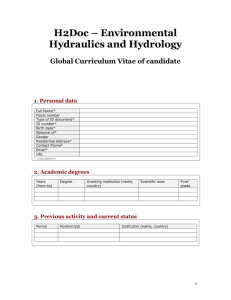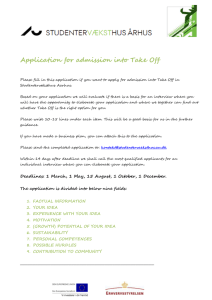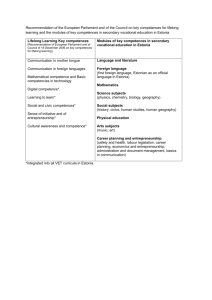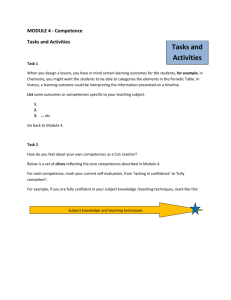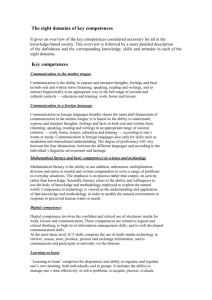teaching plan for culture and business in europe - ESCI-upf
advertisement
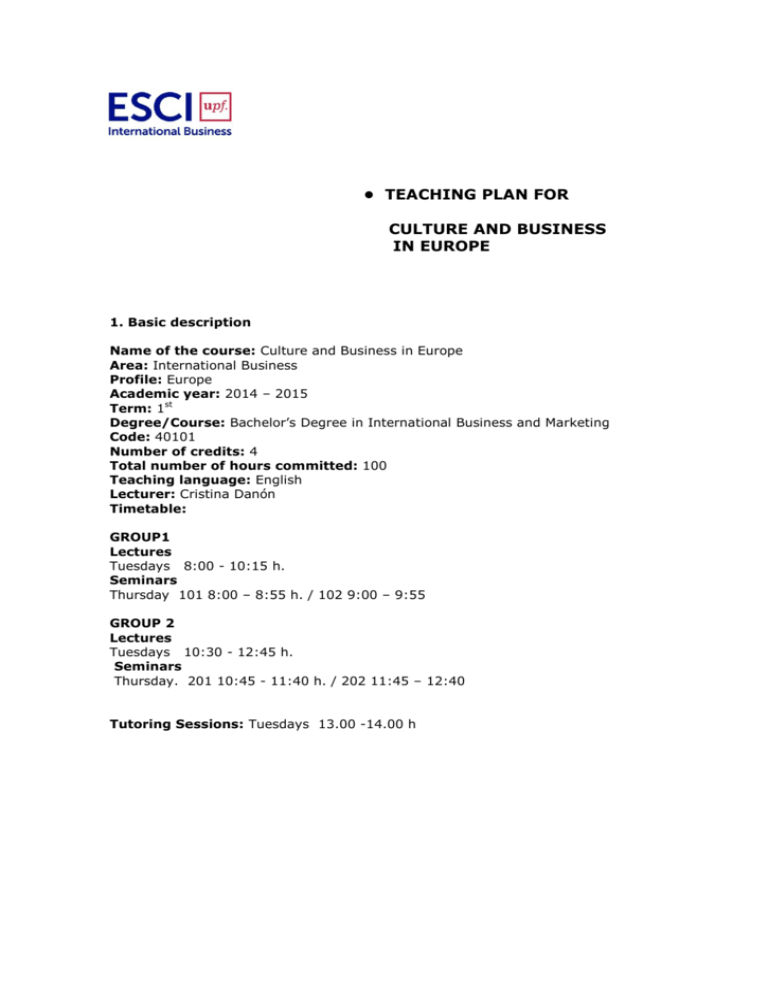
• TEACHING PLAN FOR CULTURE AND BUSINESS IN EUROPE 1. Basic description Name of the course: Culture and Business in Europe Area: International Business Profile: Europe Academic year: 2014 – 2015 Term: 1st Degree/Course: Bachelor’s Degree in International Business and Marketing Code: 40101 Number of credits: 4 Total number of hours committed: 100 Teaching language: English Lecturer: Cristina Danón Timetable: GROUP1 Lectures Tuesdays 8:00 - 10:15 h. Seminars Thursday 101 8:00 – 8:55 h. / 102 9:00 – 9:55 GROUP 2 Lectures Tuesdays 10:30 - 12:45 h. Seminars Thursday. 201 10:45 - 11:40 h. / 202 11:45 – 12:40 Tutoring Sessions: Tuesdays 13.00 -14.00 h 2. Presentation of the Course: Students will get an overview of the European market and the main cultural characteristics as well as the business environment in each country. They will learn the relevant tools for the European market entry according to the market rules and conditions, how to evaluate the potential of each country, how to determine the choice of the different distribution channels as well as to obtain useful market information, with the following outcomes: Examine a significant portion of the European experience and seek to define those elements that have given European culture its unity and its distinctiveness Understand and appraise the main characteristics of the European market, both from a business and cultural perspective. Identify business trends and opportunities in Europe. Develop a strategic approach for doing business in Europe. Learn about European business experiences Understand how to apply the business opportunities and challenges of the European markets for European and non-European firms. 3. Competences to be achieved in the course: General Competences Specific competences Instrumental competences: Disciplinary Competences G.I.1 Ability for analyse and synthesise information G.I.2 Ability to relate concepts and knowledge from different areas and for organisation and planning • G.I.8 Ability to retrieve and analyse information from different sources • G.I.9 Decision-making Interpersonal competences G.P.2. Appreciation and understanding of diversity and multiculturalism G.P.6. Ability to use information from classes and workshops for critical strategic thinking. Capacity to transpose theory from this course into practical examples G.P.7. Capacity for generating new ideas G.P. 8. Capacity to adapt to new situations G.P.17. Research skills E.D.2 Recognise and assess the duties of international economics institutions and their impact on business activity. E.D.3 Understand and recognise the geopolitical , social, and cultural dimension of a wide range of economic activities E.D.4 Provide an economic and political perspective of different areas in the world and facilitate a critical comprehension of their current processes E.D.5 Identify the economic, cultural, political, legal, democratic and business environments that may represent opportunities and threats for the development of business a Professional competences E.P.13 Improvement of communication and negotiation skills, both oral and written Systemic competences G.S.2 Ability to observe G.S.7 Promotion and respect towards E.P.16 Adaptation of the communication style to different audiences, understanding cultural differences in communication and multicultural values: respect, quality. Solidarity, commitment conveying multicultural abilities E.P.17. Ability to express and understand spoken and written communication in English at an advanced level in the international business environment. E.P.20. Ability to confront and understand the business culture and environment and propose real solutions to specific problems in the organisation. E.P.20 Ability to confront and understand the business culture environment and propose real solutions to specific problems in the organisation. The above competences interrelate with the basic competences set out in Royal Decree 1393/2007, namely: a. competence to comprehend knowledge, on the basis of general secondary education b. competence to apply knowledge to day-to-day work in international management or marketing, in particular, ability to develop and defend arguments and to solve problems c. competence to gather and interpret relevant data, enabling the development of critical judgements on the economic and social reality d. competence to communicate and transmit information (ideas, problems, solutions) to a specialised and non-specialised public e. competence to develop learning activities in a relatively autonomous manner. In order to establish a correspondence between the basic competences and those developed in the degree, these are grouped according to two criteria. Thus, the competences developed in the subject are structured into those that are seen as a development or specification of basic competences and those that define the professional profile of the graduate, with respect to general and specific competences. Basic competence : understanding of knowledge I. General competences G.I.8, G.S.2, G.P.2; G.P.6 II. Specific competences E.D.3, E.P.20 Basic competence application of knowledge I. General competences G.I.2, G.I.8, II. Specific competences E.P.16, E.P.20 Basic competence: gather and interpret data I. General competences G.I.1; G.P.17 Basic competence: communicate and transmit information I. General competences G.I.1, G.P.6, II. Specific competences E.P.13, E.P. 16, E.P.17 Competences that define the professional profile which are not included under basic competences In general, these competences combine the following key elements for professionalizing students in the area of international business and marketing: - provide students with the capacity to adapt to dynamic teams and environments - provide students with the capacity to create their own integral vision of the operation of a business or international marketing project - provide students with the capacity to take complex decisions and carry out negotiation processes I. General competences G.I.9, G.P.2, G.P.8; G.S.7 II. Specific competences E.D.5, E.P.20 Own competences of the subject Ability to empathise with and adapt to the European business environment. 4. Contents The contents of the course will be as follows: Unit 1. Introduction ▪ Introduction to the European economy. ▪ Free trade agreements. ▪ European markets potential. Unit 2. The distribution channels in Europe ▪ The distribution channels for consumer goods. ▪ The distribution channels for industrial products. ▪ The distribution channels for services. ▪ Selection factors. Unit 3. Find the right business partner in Europe. Unit 4. The main players in Europe Cultural & economic aspects. Business environment & business opportunities ▪ Germany. ▪ The United Kingdom. Unit 5. The main players in Europe. Cultural &economic aspects. Business environment & business opportunities ▪ France ▪ The Benelux countries Unit 6. The Southern countries. Cultural & economic aspects. Business environment & business opportunities. ▪ Italy ▪ Spain ▪ Portugal ▪ Greece Unit 7. The Eastern countries in The UE Cultural & economic aspects. Business environment & business opportunities. ▪The Czech Republic ▪ Slovakia ▪ Poland ▪ Hungary ▪ Romania ▪ Bulgaria. Unit 8: The Nordic countries Cultural & economic aspects. Business environment & business opportunities ▪Finland ▪ Denmark ▪ ▪ ▪ ▪ ▪ Sweden Norway Lithuania Latvia Estonia Unit 9: Balkan Republics Cultural & economic aspects. Business environment & & business opportunities ▪ Croatia ▪ Bosnia and Herzegovina ▪ Serbia ▪ Montenegro ▪ Kosovo ▪ Macedonia ▪ Albania. Unit 10. The former Soviet Republics Cultural, economic aspects. Business environment & business opportunities. ▪ Belarus ▪ Ukraine ▪ Russia. Teaching and Learning The lecturer will present each topic during the classes in PPT slides. All students are expected to prepare and study the assigned cases and readings according to the schedule in this syllabus. A great emphasis is placed on the interaction between theoretical and practical aspects. The case method is used to sharpen analytical skills and team problemsolving abilities. Experiences and cases from different situations will be shared and developed through classes and seminar discussions. Students are expected to take part in the class and seminars activities and to do their homework every week. 5. Assessment Assessment will be based on 6 parameters: ▪ ▪ ▪ ▪ ▪ ▪ Assesment elements Group case presentation Students Participation Homework presentation Individual project Surprise cases or tests Final exam Case presentation Students paticipation Homework presentation Individual project Surprise cases or tests Final exam Periodicity Kind of assessment Comp Opt Each team once in the course In each class and seminar In each class and seminar Once in the course Once in the course Lecturer Assessment Agent SelfCoassessment assessment Assessment Continuous Kind of activity Synth X Grouping Indiv Group X X Practical X X X X Practical X 10 X X X Practical X 10 X X Practical X Conceptual & Synth X 10 X 50 X X X X X X X Conceptual & Synth Each Case group must produce a collective presentation of: the the the the thinking behind the Case aims of the Case planning and progression of the Case (i.e. the activities undertaken) outcomes of their Case Each student will be also required to submit a short individual evaluation of their own input to the Case, such as the information and ideas they provide, as well as an evaluation of, and personal consideration on, the Case as a whole. Homework presentation: 10 10 Group case presentation: During the first session, the groups will be appointed. Each group will work on a case preparation and presentation. Cases will be presented and discussed during the seminars at the end of the course. Case presentation evaluation will depend on: case contents, case interest, contents coherence, demonstrated research skills, organisation and clarity of the presentation and speakers' naturalness and confidence. • • • • Weight % Homework will be assigned at the end of each class. Homework is due prior to the start of the next class. All homework must be typed. No hand written homework will be graded. Homework shall be done individually, unless otherwise indicated by the lecturer. Individual Project The Individual Projects will be negotiated between the student and the lecturer at the beginning of the course. During the first month, each student will propose an individual project subject according to the framework given by the lecturer. Individual Project options cannot be changed without the lecturer's prior agreement. The process of development of the Individual Project will be assessed by the lecturer as part of the course assessment. While much of the work will be completed outside class time, the lecturer will assume both a supervisory and advisory role. When choosing their Individual Project, students must ensure that they do not choose a subject that they are studying in any other of their courses. Final exam: the final exam will determine 50% of the final grade. Failure to sit the final exam will result in the global course grade as “not attended”. The minimum score to be achieved in the final exam is 5/10 points. To be admitted to the final exam the student must also achieve in the other assessment elements (Group case presentation, student active involvement, homework presentation, individual project and surprise cases or tests) a minimum of 4/10 points average grade. Terms of extraordinary evaluation Only students who have failed the course will be admitted to the extraordinary evaluation. To be admitted to the extraordinary evaluation, a student must have achieved a minimum average grade of 4.0 points in the activities carried out during the term (Group Case, Individual Project, Surprise cases and tests and homework presentation) The extraordinary evaluation will be only for the final exam. The activities carried out during the term cannot be retaken and keep their weights and marks earned in the term. Therefore the final grade in the extraordinary evaluation will be: - Activities carried out during the term: 50% - Retaken final exam: 50% 6. Bibliography and teaching resources ▪ “European and Business Culture” – CRANE, Robert – Prentice Hall ( Feb 9, 2000) ▪ “European Economic Integration” McDONALD, Frank and DEARDEN Stephen – Prentice hall ▪ “Doing Business and Investing in Germany”. Miles Andrew - PwC, Frankfurt am Main (July 2012) . Order it free of charge : http://www.pwc.de/en/internationalemaerkte/doing- business-and-investing-in-germany.jhtml http://www.ebooks.com/439406/passport-france/joseph-nadine-szerlip-barbaraed/ ▪ Succeed in Business: Germany (Culture Shock! Success Secrets to Maximize Business). Lord, Richard. ▪ Business cultures in Europe / Collin Randlesome and William Brierley Oxford [England] ; Boston : Butterworth-Heinemann, 1993. Edition 2nd. ed. ▪ Europe: a fearless guide to international communication and behavior / Mary Murray Bosrock / Pub: St. Paul, MN : International Education Systems, c1994. ▪ Passport Poland: Your Pocket Guide to Polish Business, Customs & Etiquette (Passport to the World) by Serge Koperdak (Sep 1999) ▪ Put Your Best Foot Forward Russia: A Fearless Communication & Guide to International Behavior / Mary Murray Bosrock ▪ Succeeding in business in Central and Eastern Europe : a guide to cultures, markets, and Practices / Woodrow H. Sears & Audrone Tamulionyte-Lentz / Boston ; Oxford : Butterworth-Heinemann, c2001 ▪ Russian etiquette & ethics in business / Drew Wilson, Lloyd Donaldson. Pub: Lincolnwood, Ill. : NTC Business Books, c1996 ▪ Business ventures in the former Soviet Union : negotiation and protocol, dos and don'ts / Joseph A. Kliger.Pub: Tulsa, OK : PennWell Pub. Co., 1994. ▪ Passport Switzerland [electronic resource] : your pocket guide to Swiss business, customs & etiquette / François Micheloud. Publisher c2001. Series Novato, CA : World Trade Press, Passport to the world ▪ Passport Poland: Your Pocket Guide to Polish Business, Customs & Etiquette (Passport to the World) by Serge Koperdak (Sep 1999) Webs: General http://etiquette-by-country.findthedata.org http://www.decipherproject.eu/documents/RLNEast/Culture%20Guide.pdf http://www.kwintessential.co.uk/etiquette/doing-business-in.html http://www.doingbusiness.org/ http://www.eupedia.com/ http://europa.eu/youreurope/business/ http://www.worldbusinessculture.com/business-with-other-countries.html http://www.incore.ulst.ac.uk/services/cds/countries/ http://www.kwintessential.co.uk/etiquette/doing-business-in.html France http://www.understandfrance.org/ http://www.invest-in-france.org/Medias/Publications/862/doing-business-versionanglaise-2012.PDF http://www.bryancave.com/files/Uploads/Documents/DoingBusinessFrance2012.pdf Russia http://biz-russia.com/russia-books http://www.kpmg.de/docs/Tax_2e.pdf Sweden http://www.sweden.se/eng/Home/Business/Business-culture/ http://www.doingbusiness.org/~/media/fpdkm/doing%20business/documents/profi les/country/NOR.pdf Hungary Hungarians a Cross http://www.filolog.com/crossculture.html Cultural Perspecitve : Germany http://www.ixpos.de/IXPOS/Navigation/EN/your-business-in-germany.html http://www.german-business-etiquette.com/ Serbia http://www.eubusiness.com/europe/serbia Albania http://www.eubusiness.com/europe/albania/albania-country-guide http://tirana.usembassy.gov/doing-business-local.html http://www.pwc.com/al/en/assets/Doing_Business_in_Albania.pdf Estonia http://www.communicaid.com/country/estonia/#.UjI5K8bxpCA http://www.pwc.com/ee/et/publications/assets/pub/doing_business_in_estonia_20 12.pdf Latvia http://www.bakertillyinternational.com/media/36861/doing_business_in_latvia21nov08.pdf Lithuania http://www.pwc.com/lt/en/assets/publications/business-guide-2013.pdf Greece http://www.globaltrade.net/f/business/text/Greece/Business-Environment-DoingBusiness-in-Greece.html Italy http://www.dbrpanel.org/sites/dbrpanel/files/doing-business-review-panelreport.pdf 7. Methodology Lecture Sessions The schedule in the following section must be used as a study guide. Students will be provided with specific readings and exercises to complement the classes. Additional readings will be recommended on request. Seminar classes At the beginning of the course, students will be provided with a certain number of readings and materials to prepare each session. The Lecturer will give instructions for each seminar and for the kind of presentation expected. On the first day, the students will be divided into groups each of which will be responsible for presenting a particular seminar. 8. Activity scheduling 1) Allocation of hours between theory and practical lessons 2 h of lecture and 2 h 15 min of seminar each week. Seminars will commence in the second week of class. 2 ) Course Schedule ▪ In the classroom: lecture classes, Seminars, face-to-face tutorials, practical classes ▪ Outside the classroom: Group work, Individual work (reports, exercises) , Independent study, Individual Project and Group Case preparation. Week Week 1 Activity in the classroom grouping/type of activity ▪ Introduction to the European Seminars Activity outside classroom grouping/type of activity (aprox 7 hours/week) Readings Week 2 Week 3 Week 4 Week 5 Week 6 Week 7 economy. ▪ Free trade agreements. ▪ European markets potential ▪ The distribution channels for consumer goods. ▪ The distribution channels for industrial products. ▪ The distribution channels for services. ▪ Selection factors. Find the right business partner in Europe. Cultural & economic aspects. Business environment & business opportunities ▪ Germany. ▪ The United Kingdom. Cultural &economic aspects. Business environment & business opportunities ▪ France ▪ The Benelux countries Cultural & economic aspects. Business environment & business opportunities. ▪ Italy ▪ Spain ▪ Portugal ▪ Greece Cultural & economic aspects. Business environment & business opportunities. ▪The Czech Group case preparation Individual project. Exercise about markets potentials Practical class: markets potential Readings Group case preparation Individual project Group Case presentation and debate Readings Group case preparation Individual project Group Case presentation and debate Readings Group case preparation Individual project Group Case presentation and debate Group Case presentation and debate Group Case presentation and debate Readings Group case preparation Individual project Readings Group case preparation Individual project Readings Group case preparation Individual project Republic ▪ Slovakia ▪ Poland ▪ Hungary ▪ Romania ▪ Bulgaria. Week 8 Week 9 Week 10 Cultural & economic aspects. Business environment & business opportunities ▪Finland ▪ Denmark ▪ Sweden ▪ Norway ▪ Lithuania ▪ Latvia ▪ Estonia Cultural & economic aspects. Business environment & & business opportunities ▪ Croatia ▪ Bosnia and Herzegovina ▪ Serbia ▪ Montenegro ▪ Kosovo ▪ Macedonia ▪ Albania. Cultural, economic aspects. Business environment & business opportunities. ▪ Belarus ▪ Ukraine ▪ Russia. Group Case presentation and debate Readings Group case preparation Individual project Group Case presentation and debate Readings Group case preparation Individual project Group Case presentation and debate Readings Group case preparation Individual project
